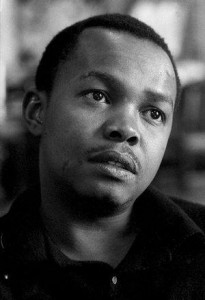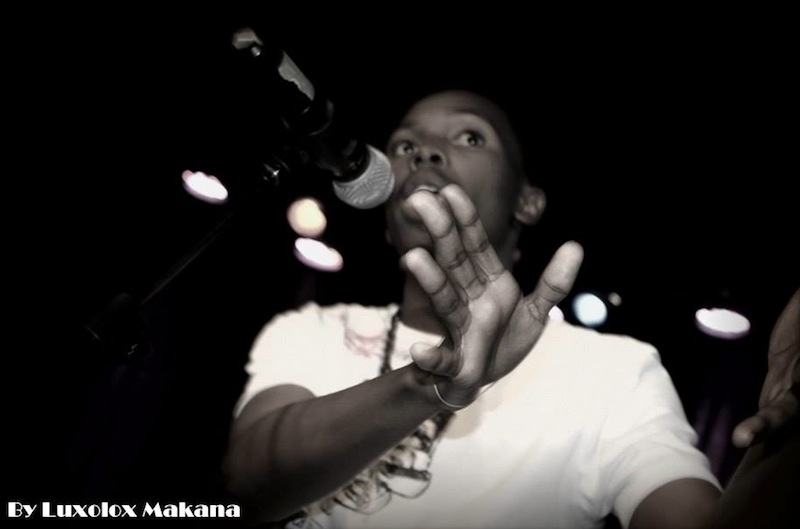This week MPHUTLANE WA BOFELO speaks with artist, scholar and poet Unathi Slasha.
If artist, literature scholar and poet, Unathi Slasha were to write a manifesto for the anarchists it would be an adaptation of Nicanor Parra’s Young Poets, with a new name, something like:
TO THE REBELS
Write as you will
In whatever style you like
Too much blood has run under the bridge
To go on believing
That only one road is right.
In poetry everything is permitted.
With only this condition of course,
You have to improve the blank page.
Unathi is unambiguously forthright about his conviction and commitment as an artist and poet who subscribes to anarchism as “a political, intellectual and artistic philosophyâ€.
There is no distinction between myself and my work. My work represents my lifestyle.
Unathi attributes his resolve to be constantly at war with everything or everyone that “diminishes the individual’s impulse” to his recognition of the fact that creative dictatorship or bullying exists at all artistic level and manifests itself in different forms, in all facets of life. He goes on at length to describe how this tyranny not only permeates all social institutions and structures including artistic and cultural platforms, but actually goes out of its way to throttle counter-culture and counter-hegemony podiums that radicals and progressives attempt to establish within mainstream platforms.
There is a certain group of people who have existed and continue to exist in the world. For a long time they have managed to establish and to maintain strictures and standards, which are only conducive to them, for everyone else to follow like sheep without questioning the nature of things. These rules, laws and standards are a malady and the problem with this kind of disease is that it prevents people, especially artistic personages, from being themselves, from expressing their ideas, notions, and views, from pursuing the kind of life they would like to live. For instance, they teach people the ‘correct’ way to create art, and impose the idea that art is just another form of entertainment. Some of them believe that art should not be ‘mixed’ with politics – ideology.Â
Instantly, one person that comes to mind is the late Watson, who said: “Real writing begins where ideology ends…†There are many others like him or probably worse than him, people who want to tell artists to “toe the line” or how to create art in an “orthodox manner”. If you ask me, this is the kind of oppression, suppression and domination and bullying we are fighting daily, the silencing of voices, the condemnation of the unique and the original, the shaming of artists who complain about the things that are making their lives a misery.Â
Corrupt people in high positions do not wish to hear the truth; they do not want to be exposed. They know that their wealth arises from the bent backs of the poor, and that this new dispensation and rainbow nation is but a travesty. They know that there are people who are not happy with the state of things right now, so the artists are silenced and bribed. These things happen. I’ve seen them myself. Now this is where people like us come in, this is why we are needed to tell the truth, even if it means shame or death. This is why I believe that by identifying yourself as dissident, avant-gardist, underground, anarchist, you are actually embracing the reality that some of the mainstream art, literature is a lullaby. You are embracing the fact that it is representing a single and biased reality, that it is painting a one sided picture in which the other side of reality is hidden away from the people. So, taking the paintbrush yourself to paint the other side means that you are not acting “a mentally retarded mime” like the rest of the artists who are marionettes.
This is the kind of problem we are faced with – as artists, poets, writers etc. There are influential people who think that writing can exist alone without any ideological standpoint – I say that is muck.
Further, being dissident or anarchist is not preposterous unruliness and chaos or some “mindless form of youthful rebellion” as Bufe would say. No, there is actually a thought and a motive behind the dissidence and rebellion. There are people who spread nonsense about anarchists, [who say] that we are just politically lethargic and disobedient youth who just want a reason to do whatever they want whilst infringing on the next person’s freedom. Of course this is bullshit, and another way to repel people and stigmatize anarchists, so that they are dismissed upfront.Â
There was a platform for the rebel, the underground, the dissident artist on Mhlobo Wenene FM. It aired every Saturday night from 11h00 till 1h00, I think. The content of the show was unbearable and it challenged the status quo – not only through the art that was being presented but also through critical discussions. I knew it was going to be banned. I was not surprised when it finally happened. What did we expect? The station is state-owned and anything that is exposing the kleptocratic and hypocritical nature of the state is taken as a threat to its very existence, therefore it is taken off immediately. You see, being dissident or anarchist is a political decision. It is to say NO to domination, to conventions that were established by the elite, maintained throughout the years as sacrosanct traditions.
Being dissident begins when one stops taking things at face value; when one speaks loudly about the taboo, about the so-called ‘sacred’ and the ‘protected’ or ‘untouchable’ or about anything that matters to him or her. I believe that a true artist is always met with trouble because of his/her work that fights domination and bullying in all forms.Â
Controversy is significant in art – make people uncomfortable, make them feel embarrassed; make them question their surroundings, the society they live in, the laws and rules that smother their individuality and liberty.Â
Dissidence starts when one rejects the mundane, the usual and the socially accepted idea of what art is and what its function should be. Today, people strongly believe that the sole function of art is simply entertainment; it should only focus on that, and stay away from anything else that’s political. This to me is of course, denial. What these people do not understand is that one cannot separate art from politics. Art is political. It is not a form of escapist outlet, like many reactionary artists, writers; intellectuals tend to make people believe. I believe people like Larry Neal and Etheridge Knight, from the Black Arts Movement, have clarified this back in the 70s. People, in fact, black artists, who reject this idea that art is supposed to be a vehicle for ideology, are in truth, bereft of a sense of history and comprehension of art and literature.
Unathi draws strength and inspiration from his social background and the stubborn faith in humanity displayed by the response of the people to his works:

Sometimes when I walk around Khayamnandi, people ask me where the book is. When I ask what book they say the one you have written. I always laugh to hide the sadness and embarrassment the question causes because I feel bad that they don’t understand – it is not that easy. These are the moments that keep me alive and strong and to continue with what I am doing. I believe I am where I ought to be at this very moment. Time is going to take me where I should be in the future. I am not rushing anything. I am patient with the little progress I am making. Already I’ve met and shared stages with some of the literary giants I always admired and respected in South Africa. And that to me is pretty much a lot because some of them are quite humble and encouraging people.
Unathi’s Eastern Cape hometown, Despatch, is his muse and the world is his platform:
I would like to tell stories about the Old South-African Flag that is flying in a lot of white people’ yards, in Despatch. Stories and poems about white people who strut to voting stations wearing National Party t-shirts; about young whites who have 60-year-old black women cleaning up their apartments and washing their undergarments and socks; about the ‘Museum’ in Despatch that tells a story of white people who discovered this place – and nothing about the suffering blacks – and how those whites became rich off the back of those hard-working blacks; stories and poems about black mothers and fathers and uncles and aunts who wake up every day in the morning to go bow and scrape for peanuts, and come back to spend those coins in a shebeen or in a church. Ever since I had an intimate friendship with literature I always wished to travel around spouting poems and sharing my experiences and ideas about life and art and my environment.
This anarchist artist has a clearly defined purpose and mission:
I think my purpose is to communicate ideas and share life lessons with all willing ears and open ears and hungry minds. And also to learn in the process from the people I am sharing and communicating with. Sometimes people are going through tough times and they listen to your poem and after the recital they come and shake your hand and say thank you – that’s an achievement – if that could happen each time I recite something then it is a huge achievement.
I’m here to share my world view and my personal experiences about the society I’m living in … I think that’s one of the beauties of literature, taking stories from the ordinary people and making them known so that others can learn something from them. I think that’s my main mission as a poetry and short story writer.
* This interview has been edited for brevity and clarity.
* Images via Facebook

![Unathi Slasha 2 [facebook]](https://www.thedailyvox.co.za/wp-content/uploads/2014/08/Unathi-Slasha-2-facebook.jpg)








